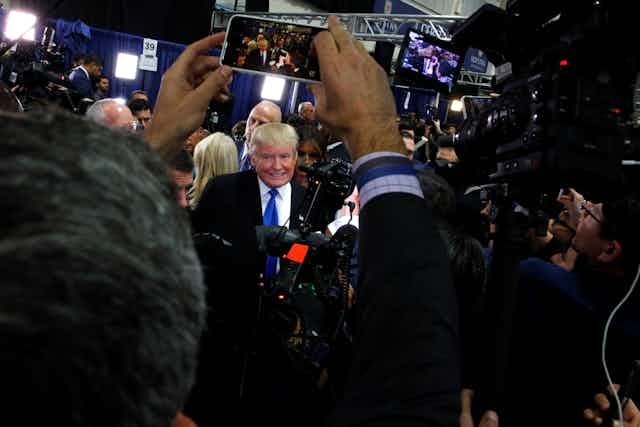Donald Trump’s conduct throughout his campaign for president of the United States has brought into renewed focus a question made famous by Pontius Pilate: what is truth?
Trump has exploited the 24/7 symbiotic news cyclone in which social media and the professional journalism of traditional media are both caught up.
He first creates social media excitement with an outrageous lie, then watches as traditional media, scrambling for “hits” and “eyeballs”, amplify those lies without first troubling with time-consuming verification.
This is an ethical crisis for the media, but it also a crisis for democracy.
In September this year, The Economist ran a cover story headed:
The art of the lie: Post-truth politics in the age of social media.
It took Trump’s campaign as the paradigm case. It said of Trump that he:
… inhabits a fantastical realm where Barack Obama’s birth certificate was faked, the president founded Islamic State, the Clintons are killers and the father of a rival was with Lee Harvey Oswald before he shot John F. Kennedy.
In this post-truth age, The Economist argued, truth was of secondary importance. The lies of people like Trump were not designed to create a false view of the world but to reinforce prejudices.
In the spring 2016 issue of Meanjin, The Guardian Australia’s political editor, Katharine Murphy, posed this question: what role for journalism if facts no longer count?
Describing the current journalistic operating environment, Murphy wrote:
We have to understand that we now practise professionally in a post-truth environment, where our audiences can increasingly choose to exist comfortably inside bubbles, selecting only the information and commentary that reinforces their views, rejecting other material.
To paraphrase The Economist again, voters are cast adrift on an ocean of lies, with nothing to cling to.
The common factor underlying both critiques is that voters are so disconnected from, and disillusioned with, the political process, and have become so inured to the dishonesty of politicians and the media content of politics, that they take refuge in the reinforcement of their own prejudices.
Thus they are easy prey for the outpourings of post-truth politics.
For democratic capitalist polities, where voters depend on a bedrock of reliable information on which to base decisions about political, economic and social life, this state of affairs is ultimately unsustainable.
How did we get here?
In 2011, Lindsay Tanner, finance minister in the Rudd Labor government, published a book called Sideshow. In it, he excoriated politicians and the media alike for dumbing down democracy by focusing on personalities, ephemera and trivia.
Broadly speaking, his thesis was that as the traditional media laboured under the acute financial pressures induced by the digital revolution, they increasingly reduced everything – including politics – to entertainment.
Politicians had then responded by playing to the new rules, so that the contest of ideas had been supplanted by a contest for laughs.
Today his argument looks prescient. A dumbed-down democracy devalues the currency of political debate. A devalued currency engenders distrust. Distrust leads to disillusionment, cynicism and disengagement.
It is made worse by a climate of economic insecurity and a sense of inequity exemplified in Australia by the popular rejection of the 2014 federal budget. When people feel threatened or pushed aside or left behind, they look for scapegoats and are eager to believe anything that supplies them with one.
Post-truth politics, with its comforting reinforcement of prejudice and its fleetingly entertaining outrages, is ready-made for the task.
What is to be done?
Murphy’s piece provided a useful starting point. She says that if journalists think technological change was the biggest threat to their profession, they were deluding themselves. She wrote:
We have to look in the mirror. Our intemperate excesses have discounted our own moral value. Our own behaviour has helped fuel a lack of trust.
So the profession of journalism has a responsibility not to just swim along in the flood of untruths and “truthiness” – something close to the truth but in fact a lie – because it makes for extra “hits” or a fleeting laugh.
It has a responsibility to verify facts before publication – not afterwards – and call out falsehoods for what they are.
That way, the professional media can place a filter on the flood and uphold an ideal expressed by John Stuart Mill: to exchange error for truth and to create a livelier impression of truth produced by its collision with error.

